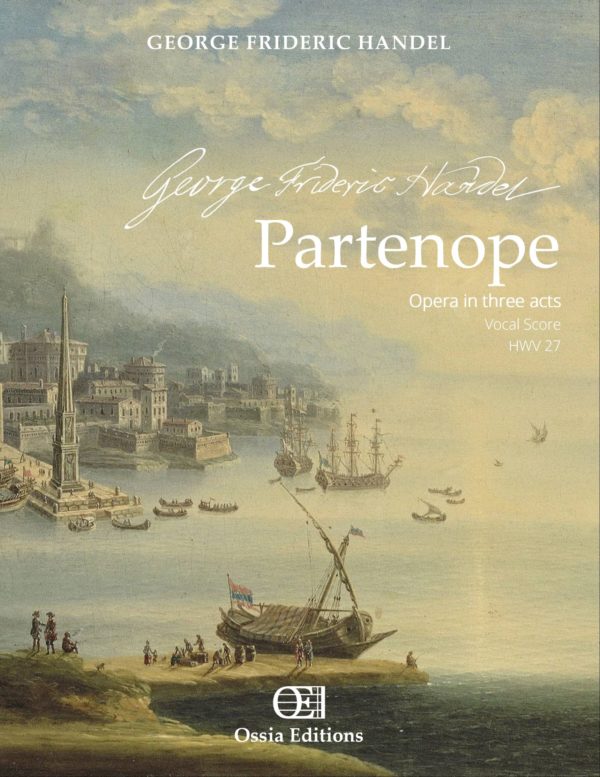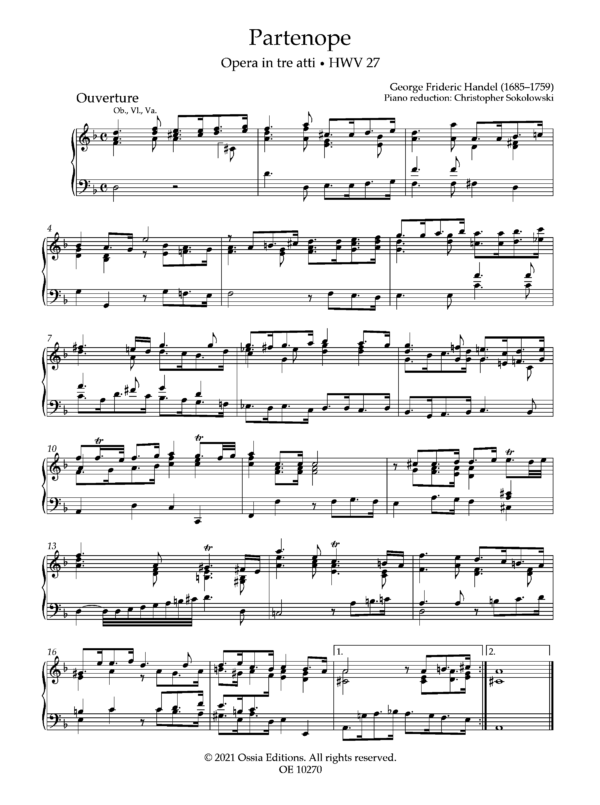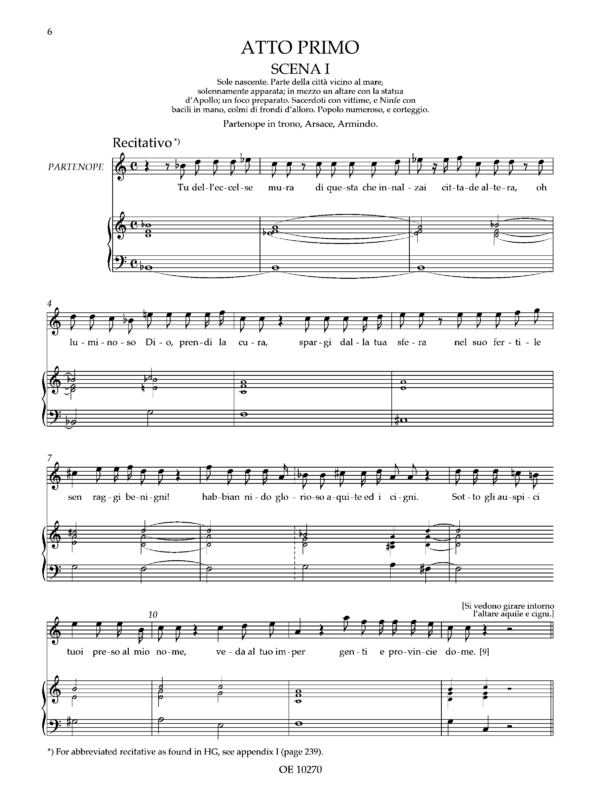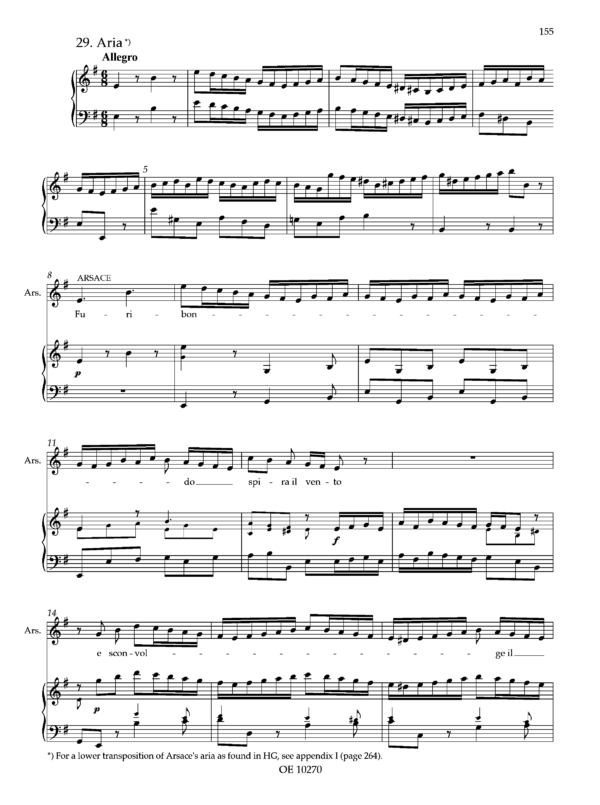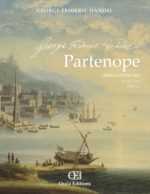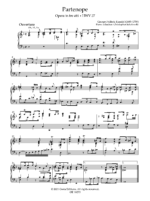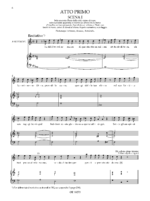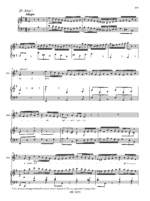Partenope HWV 27
George Frideric Handel
Partenope, soprano
Emilio, tenor
Armindo, mezzosoprano or alto
Ormonte, baritone or bass
Rosmira/Eurimene, mezzosoprano or alto
Arsace, mezzosoprano or alto
Opera in three acts
Piano reduction / vocal score
Edition: OE 10270
ISMN 979-0-800140-07-5
The first ever vocal score (piano reduction) of Handel’s opera in three acts, Partenope, HWV 27. This vocal score is based primarily on Friedrich Chrysander’s edition of Partenope (HWV 27), produced by the German Handel Society (HG 78) and Handel’s 1730 autograph manuscript.
Contents: Preface, Index of numbers, Ouverture, Atto primo, Atto secondo, Atto terzo, Appendix I (HG), Appendix II (MS)
Backround:Handel’s first encounter with Stampiglia’s libretto was likely in 1708 during the Venice Carnival where he attended a performance of Antonio Caldara’s setting of the work. He was also familiar with Leonardo Vinci’s 1725 version, La Rosmira fedele, and this may have been what urged him to initially to compose his own setting. Handel first proposed the libretto of Partenope to the Royal Academy of Music in 1726, but it was rejected immediately, impresario Owen Swiny claiming “it is the very worst book (excepting one) that I ever read in my whole life.” Founded in 1719, the Royal Academy of Music had become known for their constant offerings of Italian opera seria to London audiences, and Partenope’s light-hearted, frivolous nature was seen as too much of a departure from what the audiences in England have come to expect on the stage. However, the Royal Academy of Music encountered trouble at the end of their 1727/28 season as their principle singers at the time had returned to Italy without any intention to return to the Hay-Market Theatre. Without any luck in recruiting new principle singers, the Academy was forced to abandon their 1728/29 season, and Lord Perceval of the Parliament wrote that the King’s Theatre and the Academy were to be made fully available to both Handel and Jacob Heidegger, the manager of the theater, for a minimum of five years. It was with this decision that the “Second Academy” was born, and with his new freedom to see his artistic endeavors brought to fruition, Handel promptly went to Italy to recruit new principle singers for the upcoming 1729/30 season. The Royal Family’s great support of the singers created quite a buzz around London, Princess Amelia claiming that “it is the compleatest troop one could have expected.” As Handel’s first premiere of the season, Lotario, was not very successful, he promptly revived his ever popular 1724 Giulio Cesare so he could direct all of his energy to finally creating his Partenope.
Contents
ATTO UNO
Ouverture, Coro
Aria L’amor ed il destin combatterà per me
Aria O Eurimene ha l’idea di Rosmira
Aria Se non ti sai spiegar
Aria Voglio dire al mio tesoro
Aria Un’altra volta ancor mi promettesti amor
Aria Sento amor con novi dardi
Aria T’appresta forse amore sol gioie e sol piacer
Aria a due Ed io per te / Per te moro
Aria Sei mia gioia, sei mio bene
Aria Dimmi, pietoso Ciel
Aria Anch’io pugnar saprò
Aria Io ti levo l’impero dell’armi
Aria È figlio il mio timore d’amor e di pietà
Aria Io seguo sol fiero
ATTO SECONDO
Sinfona, Marche, Coro, Sinfonia, Coro
Accompagnato Contro un pudico amor
Aria Barbaro fato, sì
Arioso Care mura, in si bel giorno
Aria Voglio amare insin ch’io moro
Duetto E vuoi, con dure tempre / Infido, ingrato!
Aria Furie son dell’alma mia gelosia
Aria Poterti dir vorrei l’affanno del mio cor
Aria Non chiedo, o luci vaghe
Aria Qual farfalletta gira a quel lume
Aria Furibondo spira il vento
ATTO TERZO
Sinfonia
Quartetto Non è incauto il mio consiglio
Arioso Arsace, o Dio, così infido l’ingannò
Aria Spera e godi, oh mio tesoro
Aria La speme ti consoli
Aria Ch’io parta? sì, crudele
Aria Quel volto mi piace
Aria Nobil core che ben ama
Arioso Ma quai note di mesti lamenti
Accompagnato Cieli! che mira?
Terzetto Un cor infedele si deve punir
Aria Fatto è Amor un Dio d’inferno
Aria La gloria in nobil alma
Sinfonia
Aria Sì, scherza, sì, sempre Amor con doppia face
Aria Seguaci di Cupido, voi che cangiate ogn’or
Coro D’Imeneo le belle sede splendon fauste in questo dì
APPENDIX I
Abridgements and alternate transpositions as printed in the 1879 full score produced by the Händel-Gesellschaft (HG)
Recitativo Tu dell’eccelse mura
Recitativo Arsace—Armindo—Osserva!
Recitativo Regina, in folte schiere
Recitativo Cavalier, se gli Dei rendan pago il tuo cor
Recitativo Armindo, ardisci
Aria (B minor) Voglio dire al mio tesoro
Recitativo Ah ingannator!—Vaneggio?
Recitativo Se guerra Emilio vuol’, si guerra l’abbia
Aria (Alto version) T’appresta forse amore
Recitativo Forti miei schiere, alla vicina impresa
Recitativo Regina—Armindo, ancora tu mi devi
Aria (F♯ minor) Non chiedo, oh luci vaghe
Recitativo Combattono il mio core
Aria (D minor) Furibondo spira il vento
Recitativo Rosmira, ove ti guida sdegno tiranno e cieco?
Recitativo Ma Partenope vien; finger degg’io
Scena Ultima (as performed in the December 1730 revival):
Recitativo Regina, in questa arene
Aria (substitute aria) Seguaci di cupido
Recitativo Tu vanne in libertate
APPENDIX II
Additions and adjustments corresponding to the 1730 autograph manuscript (MS)
Recitativo Soccorso!—Armindo e teco
Recitativo Renditi, o pure estinto
Recitativo Emilio!—Alta Regina
Recitativo Non può darsi in un petto
Recitativo A prò di chi t’offese perché tante preghiere?
Recitativo Di bel desire avvampo in difesa d’Arsace

